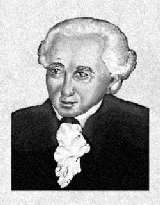
Born: April 22, 1724, in Königsburg, Prussia
Died: February 12, 1804, in Königsburg, Prussia
There are few details about Kant's early life until the time that he entered university in 1740. He enrolled as a theology student but was fascinated by the work of Sir Isaac Newton and placed considerable emphasis on the study of mathematics and physics.
Kant graduated in 1746 and, after serving as a private tutor, gained the position of lecturer at the university. In 1770 he accepted a full professorship there and it was shortly after this time that he began to publish a series of original works on metaphysics.
His early work followed closely the rationalist school of thought that had been defined by Liebniz and Wolff, but as Kant became acquainted with the writing of Hume, his opinions underwent a complete reversal. Despite his work with mathematics and physics, Kant's writings gravitated toward a strictly philosophical approach to metaphysics.
Kant's intention was to establish a model of metaphysics that allowed for the structure and reason of science as well as the existence of God and immortality. His first attempts were combinations and extrapolations of his predecessor's works but he was unable to develop a rational model.
In 1770, he began work on Critique of Pure Reason, a project that would take him almost eleven years to complete. When it was finished, it had grown from a simple critique into a complete model of metaphysics. Kant was satisfied with the work but continued to expand upon this theories in two subsequent publications; Critique of Practical Reason in 1788 and Critique of Judgment in 1790. While Kant felt the works sufficiently proved his position, his metaphysics have always been subjected to severe criticism.
Kant was often in demand as a speaker and lecturer but he declined offers from other universities. He spent his whole life in Königsburg and saw little reason to leave. He died there in 1804.